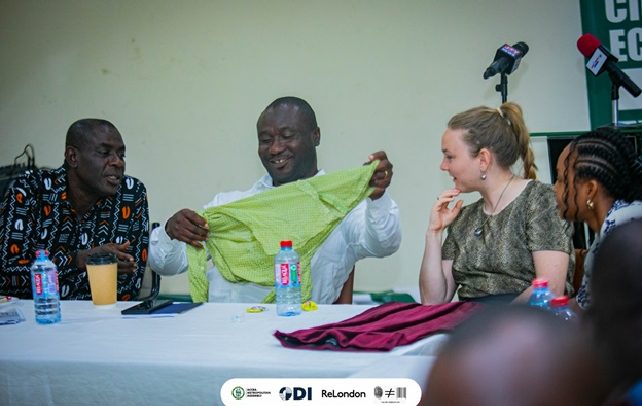A scene during the meeting
The Mayor of Accra, Elizabeth Kwatsoe Sackey, has called for sustainable approaches to managing textile waste in Ghana.
According to her, Accra struggles with second-hand clothing waste, while large volumes of discarded textiles end up in landfills due to limited resources for repurposing.
Speaking at the opening of a five-day Circular Economy and Textile Exchange Workshop organised by the Accra Metropolitan Assembly (AMA) in collaboration with the Africa-Europe Mayors’ Dialogue, the Mayor in a speech read by the director of AMA’s Waste Management Department, Engineer Solomon Noi, underscored the importance of adopting circular economy models to transform waste into economic opportunity.
The event brought together over 100 participants, including policymakers, industry leaders, and advocates from cities such as London, Durban, and Freetown to address the pressing challenges of textile waste in African cities.
“As we face this mounting challenge, partnerships with international cities can equip us with the necessary tools to sort, recycle, and upcycle textiles locally,” Mayor Sackey stated.
She pointed out that sustainable textile management could create jobs, particularly in Accra’s informal sector, representing 80% of the city’s economy.
Mayor Sackey was hopeful that with Accra at the forefront, the workshop’s outcomes would lead to lasting collaborations and innovative policies, positioning the city as a leader in sustainable urban waste management across the region.
The Communications and Production Specialist for the Africa-Europe Mayors’ Dialogue, Kenji Maghoma, said the initiative will serve as a platform for African and European cities to collaborate on practical, innovative solutions to urban challenges.
She added that this city-to-city dialogue, supported by ODI, focuses on waste management and circular economy practices that drive sustainable urban development.
Founder of the Or Foundation, Liz Ricketts highlighted the critical role of Accra’s Kantamanto Market, a major global hub for second-hand clothing.
Ricketts described the market as ‘overwhelmed’ by approximately 15 million garments each week, placing immense strain on local resources.
She stressed that aligning EPR fees with actual disposal costs would support local economies and help reduce environmental impacts.
Circular Economy Advisor at ReLondon, Rachel Singer presented London’s approach to sustainable textile practices, emphasising its commitment to a circular fashion economy.
Ms. Singer noted that London’s Environment Strategy aims to eliminate biodegradable and recyclable waste from landfills by 2026 and to increase recycling rates to 65% by 2030.
“Our mission is to transform London’s relationship with textiles by promoting circular practices that benefit both the economy and the environment,” Singer said, adding that ReLondon supports local authorities, SMEs, and citizens in making sustainable choices.
A Daily Guide Report


